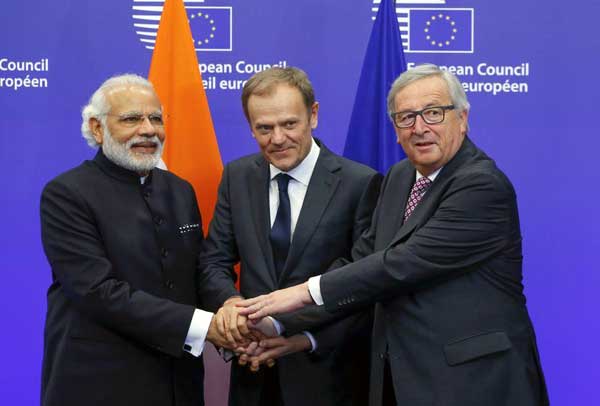With Indian Prime Minister Narendra Modi concluding his visit to key European allies, Germany and France, and the date of the 14th India-EU Summit, hosted by India, reportedly finalised for later this year, the focus is again on the viability of the India-EU strategic partnership. Many analysts have noted that after President Donald Trump’s disastrous European tour, followed by his formal withdrawal from the Paris Climate Change Agreement, Modi’s visit could not have been better timed. As US turns its back on Europe, is India reaching out to an important but neglected strategic partner?
India and Europe are pursuing domestic and foreign policy agendas, while facing many new global challenges. Their responses are based on their national security templates. In doing so, they are also shaping a new world order. Are their responses in tandem with each other? Can they be strategic partners in this new millennium?
What are these challenges? To redefine the partnership is the need of the hour. Both sides should agree on a common strategic paradigm. Negative perceptions must be fully addressed. Multiple crises within Europe have negatively impacted EU’s image among Indian media, public opinion and policymakers. Europe appears to be in accelerating decline, not ascent. Europe too has become inward looking with foreign policy taking a backseat. In the midst of confusing signal about the direction of Brexit negotiations, EU needs to project itself as a major global power centre, whose strategic perceptions globally and in India’s neighbourhood, coincide with India’s perspectives. With two permanent members in the Security Council, EU should demonstrate that it is a global political player, capable and willing to use military power when required or to play the role of a power broker during a global crisis.
It is unfortunate that the EU continues to be in a state of denial regarding the crises. The reluctance to give priority to the relations with India, over China is baffling, as is the insistence on a human rights dialogue with India. India can at best be at second place. This is privately commented upon by senior Indian officials who contrast it with the American approach. Most EU ambassadors here also privately acknowledge that that continuous finger pointing and focusing on India’s “flaws” or a one sided dialogue do not make for a good relationship. EU should accept that India, as a trillion dollar economy is a valuable asset for Europe and the trade and business partnership as important as with China.
The challenge posed by the Indo US partnership to the India EU strategic relationship has hardly been publicly discussed. Many Indians believe that given the complexities and sensitivities of India’s difficult neighbourhood and the threat of terrorist strikes from across its borders, an alliance with the USA is the need of the hour, rather than with the EU which appears divided and in decline. So far the Trump presidency has not turned its back on this partnership. A meeting with President Trump and our Prime Minister is reportedly scheduled for end June.
Do summit level consultations invigorate the partnership? The 13th India-EU Summit in Brussels on 30 March 2016 held in the shadow of the terrorist attacks in Brussels on 22 March 2016 brought the Indian Prime Minister closer to the EU leadership. It highlighted international terrorism as an unacceptable affront to open and democratic societies of Europe and India. It is widely expected that the 14th Summit will provide a breakthrough in the background of ‘fortress America’ and Europe’s search for new allies in Asia.
Under the present government, important measures were taken to reinvent, redirect and reinvigorate India’s foreign policy imperatives. How have these impacted relations with Europe? EU High Representative Mogherini visited Delhi in April 2017 and reportedly had an excellent interaction with the Indian Prime Minister. The relationship seems to have now acquired a new momentum. EU sources in Belgium are confident that the new Summit under a business minded and dynamic Prime Minister Modi will finally develop a new strategic paradigm with Europe. India is now at the forefront of global political dialogue and discussions. Many of its new global priorities, including UN Security Council reform, climate change and global warming coincide with the EU. Others such as the need to reform the governance mechanisms of global financial institutions do not. In this 17 year journey since the first summit, much water has passed under the bridge and many ideological differences have been put aside. Both realised the need to jointly address many agreed common strategic challenges in a difficult international scenario.
India seeks a pragmatic and real multi-polar balance in a world of civilisational and cultural diversity. Even in the actual complexion of existing different regional orders — whether it West Asia, Eurasia, East Asia — the Indian approach prefers a security architecture that is a blend of balance of power, norms and accommodation rather than the western Westphalian preference for hierarchical security blocs checking each other.
The 14th Summit in its joint declaration may address this issue at length. The EU and the Commission are now showing greater sensitivity to India’s perspectives. EU needs to understand that while India may need to be more circumspect in its strategic choices and be more sensitive to changing external conditions, India has no other option but to doggedly preserve its strategic independence for the tumultuous years ahead. In this journey, India would appreciate the support from one of its most important strategic partners, the EU. To do so, India too needs to carefully re-craft its relations with the European Union. It represents a new historical narrative in the making.
Courtesy: First published on www.southasiamonitor.org





